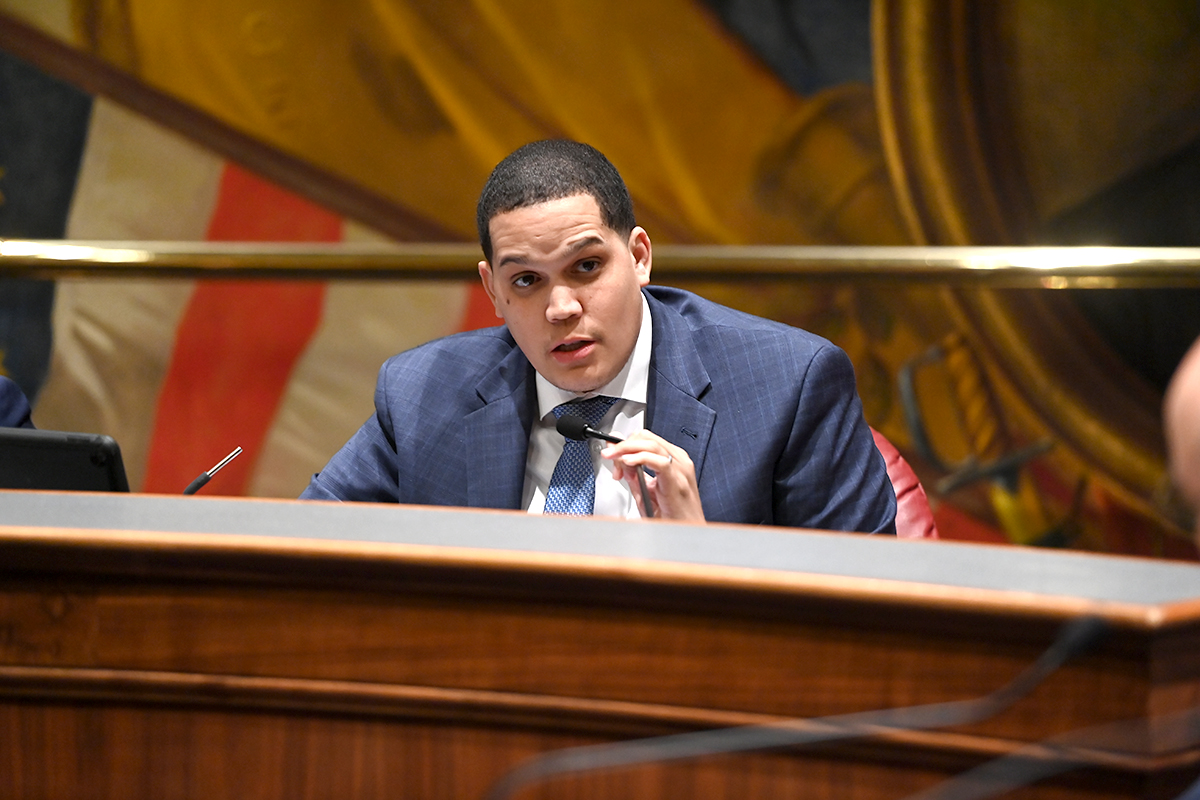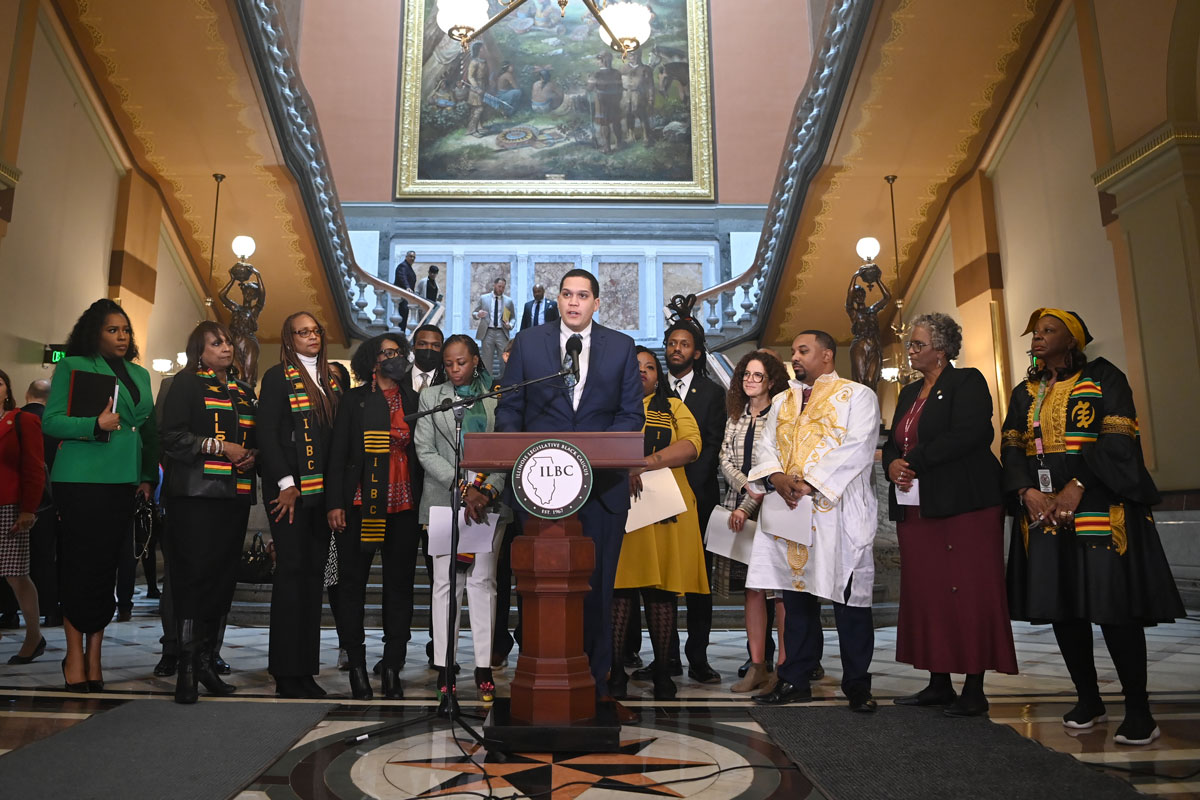Peters passes bill to help individuals previously convicted of a felony gain employment
- Details
- Category: Press Releases

“Navigating employment with social barriers such as previous felony convictions can be a strenuous process,” said Peters (D-Chicago). “Making jobs more accessible for those looking to move on from their past is a sensible way to provide them with the opportunity to be financially independent.”
Occupational licenses are required of individuals seeking employment at gaming operations such as at a casino or an Organization Gaming Facility.
Instead of an automatic disqualification, Senate Bill 1462 would require the Gaming Board to apply the standard for considering prior convictions in employment decisions established under the Human Rights Act.
The Human Rights Act prohibits an employer from using a conviction record as a basis for refusing to hire someone unless there is a substantial relationship between one or more of the previous criminal offenses and the employment sought. The Human Rights Act additionally prohibits an employer from using a conviction record as basis for refusing to hire someone unless granting employment would involve an unreasonable risk to property or to the safety or welfare of specific individuals or the public.
“Hardworking individuals looking to reestablish themselves should be given a second opportunity to show their contributions to society,” said Peters. “Individuals with prior convictions deserve opportunities obtain financial resources legally and with dignity.”
Senate Bill 1462 passed the Senate Executive Committee and will now head to the Senate floor for further consideration.
Peters supports bill to require financial screenings for uninsured health care patients
- Details
- Category: Press Releases

“Black and Brown communities are more likely to suffer from medical ailments like high-blood pressure, diabetes and heart disease,” said Peters (D-Chicago) “These conditions often trigger additional health issues, increasing the likelihood of medical debt. Proactive financial assistance screenings are needed to reduce the chance of medical debt accumulation.”
Senate Bill 2080 prohibits hospitals from pursuing collection actions against uninsured patients if they have not completed the screening requirements. The measure also forbids the sale of medical debt, places limitations on collection actions and establishes penalties for violating the proposed law.
The bill requires screenings and all follow-up assistance to be culturally competent, in the patient's primary language, in plain language and in an accessible format.
“When going through a medical issue the last thing you want to be worried about is how you’re going to pay for it,” said Peters. “Financial assistance given in the most uncomplicated way empowers people to recover from their ailments worry free.”
“As a state representative, I see it as my duty to do everything I can to help even the playing field when it comes to health care coverage,” said Avelar (D-Bolingbrook). “I look forward to working with my stakeholders and my fellow legislators to expand health care coverage for all Illinoisans.”
Senate Bill 2080 awaits a hearing in the Senate Insurance Committee.
Black Caucus outlines vision for upcoming session
- Details
- Category: Press Releases
 SPRINGFIELD – The Illinois Legislative Black Caucus announced they will focus on passing a balanced budget that uplifts low-income and working families and enhances classroom and early childhood education.
SPRINGFIELD – The Illinois Legislative Black Caucus announced they will focus on passing a balanced budget that uplifts low-income and working families and enhances classroom and early childhood education.
“The governor’s proposed budget showcases a continual dedication to fund programs that promote public safety and equity for all Illinois residents,” said State Senator Robert Peters (D-Chicago). “A budget proposal that contains investments in schools, small businesses, working families and our environment reframes key investments that have traditionally left out Black and Brown communities and is a step toward progress.”
After Governor JB Pritzker outlined his legislative priorities, the Black Caucus highlighted the importance of putting the voices and needs of Illinois’ Black communities at the forefront of upcoming budget negotiations.
The governor’s outline would put a total of $250 million toward a new program – SMART Start Illinois – a multi-year program to provide investments in preparing children to be lifelong learners. This includes increasing preschool availability and Early Childhood Block Grants. It also includes funding for the Minority Teacher Scholarship Program.
To continue Illinois on the path toward making more equitable, it also continues the commitment of a $350 million increase to K-12 funding.
“Children’s destinies begin at birth, making it vital that education is prioritized from then until college,” said Senate Majority Leader Kimberly A. Lightford (D-Maywood). “As a General Assembly, we will do what is right by the people of Illinois and continue to fight for equitable funding and access to education. I share in the governor’s enthusiasm for providing our youth with greater opportunities for success – from investing in early childhood education to ensuring our schools are fully funded.”
The budget outline also prioritizes business attraction and development, workforce training, public safety, violence prevention and more. A major part of the proposal is a $350 million investment for crisis response efforts to expand housing support and increase job opportunities for the homeless.
“As we begin negotiations, it is important that we pass a budget that is balanced, responsible and invests in hardworking people in all corners of our state,” State Senator Elgie R. Sims, Jr., the Senate’s lead budget negotiatory, said. “As chair of the Senate Appropriations Committee, my pledge to the people of Illinois is that we will bring forth a budget that works to solve the pressing economic issues facing our working families and that makes investments in education, small businesses, public safety and more to provide a brighter future for our state.”
Members of the Illinois Black Caucus will work together over the coming months to solidify a budget that prioritizes all communities.
Peters: Our budget must promote public safety, equity and housing resources
- Details
- Category: Press Releases

SPRINGFIELD – State Senator Robert Peters is optimistic about proposals promoting public safety and equitable housing that were included in the governor’s budget address.
“We have made great strides in recent years to make our state more equitable – from our schools to our communities,” said Peters (D-Chicago). “But our work is not done until all people – regardless of ZIP code or the color of their skin – have the same opportunities to succeed. I am optimistic about the proposals outlined by the governor, and look forward to ongoing negotiations to show the people of this great state that we are building a future for the many and not the few.”
Peters was pleased the governor included investments to prioritize communities through the reimagine public safety grant program, uplift small business owners, and make housing more affordable and accessible.
“The governor’s proposed budget showcases a continual dedication to fund programs that promote public safety and equity for all Illinois residents,” said Peters. “A budget proposal that contains investments in schools, small businesses, and working families reframes key investments that have traditionally left out Black and Brown communities and is a step toward progress.”
The proposed budget also includes a $350 million total investment toward homelessness, crisis response, and expanding housing resources.
“Services such as rental assistance and supportive housing are positive ways to support our homeless neighbors and put them back on the path of rental stability,” said Peters. “Addressing the problem at the root with employment opportunities, outreach services and supportive housing are great steps to empower our homeless neighbors.”
Peters will work alongside his Senate colleagues over the months to come to bring forth a smart, equitable spending plan.
More Articles …
Page 43 of 95





